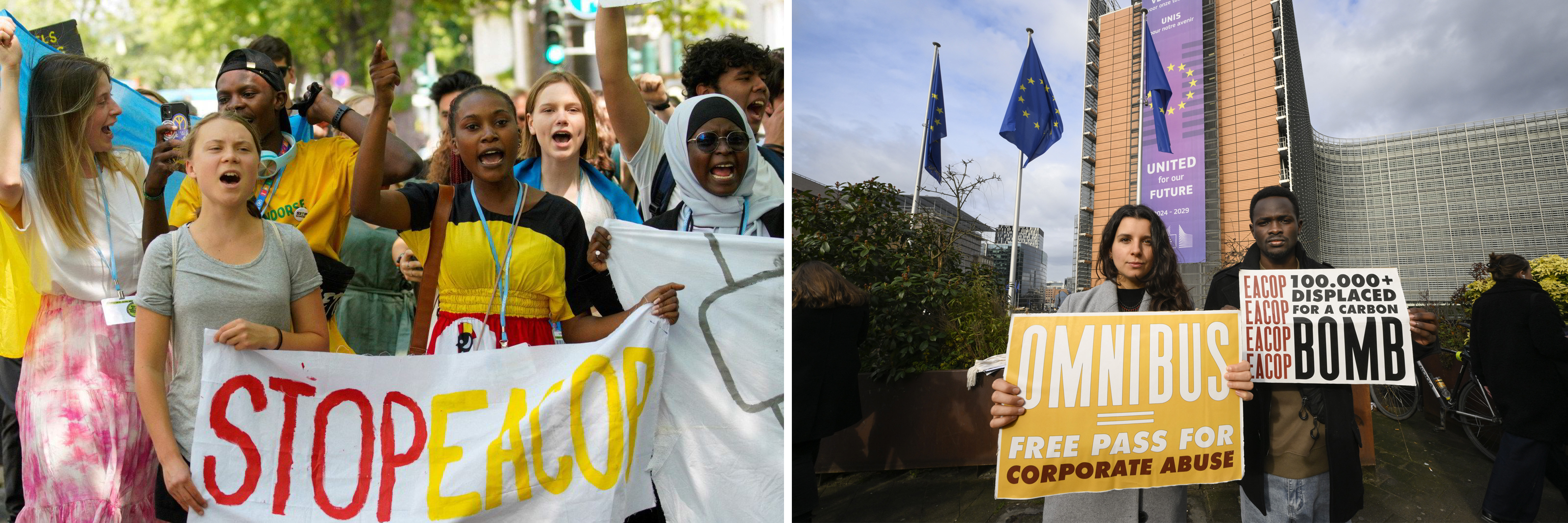Resistance against the French crude oil pipeline in Uganda
Text by Cyrill Hermann (climate activist) in collaboration with Ugandan activists, 28 May 2025.
From Lake Albert to the Tanzanian coast, a 1,443 km heated oil pipeline is to be built through nature reserves, villages and sensitive ecosystems. But the promised development for Uganda remains an empty promise. Over 100,000 people are losing their land, their homes, their livelihoods, and their culture. At the same time, the climate crisis is being exacerbated by the use of fossil fuels and is hitting people in the Global South the hardest. Women and girls are particularly affected by displacement and their living conditions are deteriorating massively. According to a study by Oxfam (an international network of aid and development organizations), displacement has a disproportionate and negative impact on women. It makes them more vulnerable to gender-based violence. An increase in unpaid care work by women is also likely.
The project is being planned and built by the French oil company Total Energies and mainly financed by the China National Offshore Oil Corporation, with the aim of transporting the crude oil to Europe.
"The government announced that they needed land now [...] and that the pipeline would go from Lake Albert to Lake Victoria. I knew then that this project would take away so many people's land, animals, culture and ultimately their livelihoods". (activist, 2025)
Despite massive repression by the authoritarian Ugandan government, activists are taking to the streets with many others against the pipeline. In addition, the #StopEACOP campaign is organizing demonstrations and actions in front of European financial and insurance institutions. In response to this pressure, numerous insurers and banks have already withdrawn their support for the project and Total has still not been able to finalize its financing. Despite this, the French oil company is sticking to its plans and has already started construction on some sections of the pipeline.
This example is a perfect illustration of the structural destruction caused by fossil capitalism. The East African Crude Oil Pipeline (EACOP) is more than just an infrastructure project - it is a symbol of modern neo-colonialism. The project is part of a long history of colonial exploitation of the resources of the Global South.
"EACOP is not a progress – it is a step backwards. It is ripping people from their homes and fuelling the climate crisis - for the profit of a few in the Global North." (activist, 2025).
Cyrill Hermann (no pronouns) graduated from the Enge cantonal school in 2024 and is currently studying ethnology and geography at the University of Zurich. Cyrill has also been active in Climate Strike Switzerland since 2019, where he deals with the connections between colonialism and the climate crisis and with issues of climate justice. In February 2025, Hermann also published the book ‘What do we want?’ with Rotpunktverlag.
Further reading: Hermann, C. (2025). What do we want? The climate strike - from system change to climate justice. Zurich: Rotpunkt Verlag.
